Richard Goodman's Blog, page 10
January 22, 2024
Last passport
I’m renewing my passport Wednesday. I have a 1pm appointment at my local post office here in rural Louisiana. I’m 78. We know passports are good for 10 years. I figure this will most likely be my last.
Yes, I’m aware that many people these days are living to be in their 90s and even to 100. But if you were a betting person, would you put your money on me getting another passport after this one? I wouldn’t.
They used to let you keep them when you renewed, but in recent decades, no. So I don’t have a record of my last two or three passports, unfortunately. But I still have my passport from fifty+ years ago.
What a lift it is to look at that young man and the record of his globetrotting!
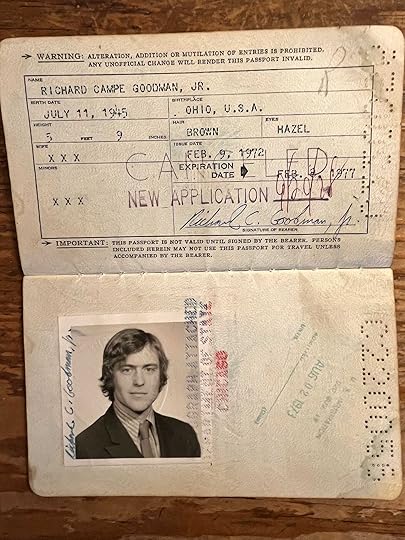 The young man, neatly dressed, slightly long hair combed, natty striped shirt and nearly tight tie, is 26.
The young man, neatly dressed, slightly long hair combed, natty striped shirt and nearly tight tie, is 26. He went to a lot of exotic places. Of course, most anyplace he went to would be exotic. He’d never been anywhere. So, Ottawa would have been exotic.
 This is just the first page!
This is just the first page!But he didn’t go to Ottawa. He went to Lebanon, Syria, Greece, Italy and Yugoslavia. He went to Bulgaria, Romania, Hungary. He went to Czechoslovakia, Austria, Germany and Switzerland. To France, England and Scotland. To Holland, Denmark and Norway. And to Spain and Morocco. Each of those countries has a strong, unique taste associated with its name, like a spice.
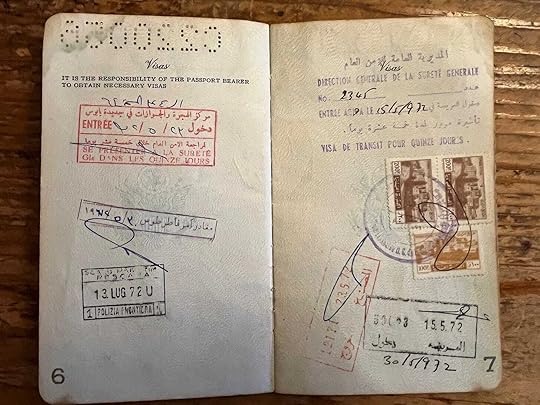 A passport should look messy and crowded, with words you can’t read.
A passport should look messy and crowded, with words you can’t read.A passport is that most individualistic of documents. You don’t need to prove anything to obtain one, except that you are who you are. Then it becomes an official scrapbook, a record of traipsing, of whims, of careful planning and scrimping, of astonishments, even of fear and loss. Back then, when they stamped a passport, they used actual stamps that were micro-paintings. When I looked at my passport, I knew I’d been to that country.
 These marks are a kind of travel tattoos.
These marks are a kind of travel tattoos.A passport in your hand says: Let’s go! Where? Well, anywhere! You and me, we can do this, we want to do this. We don’t have much money? So what? We’ll make do. We’ll sleep in campgrounds, cheap hotels, hostels. We’ll eat street food. We’ll walk, walk, walk. We’ll travel!
Some people have called me a romantic, as if it were something like having fleas. As if by being a romantic I am a sappy dreamer who wants to turn my back on reality. But some things are romantic! Traveling in faraway lands when you’re young, eating strange food, listening to unheard-of music, meeting people who speak other languages but with the same language of the heart—that is romantic! I stand by that.
Now, here we are fifty years later.
I’m holding my most recent passport.
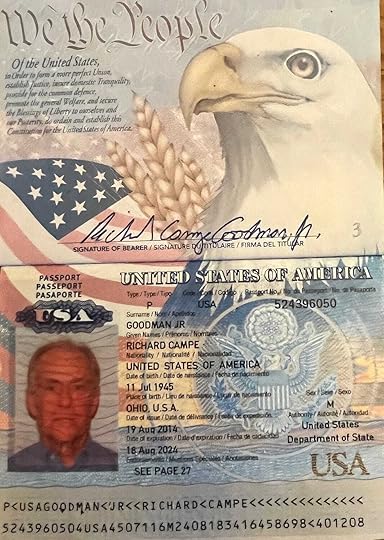 Look at the lines over my face, like I’m in an aquarium.
Look at the lines over my face, like I’m in an aquarium.See how complex and cautious the document has become. Look at the watermark and the hologram. (There is a barcode on the inside back cover.) It’s so protective, this passport, with all sorts of hidden alarms and shibboleths. “Be careful!” it seems to say. “Do you really have to go there?”
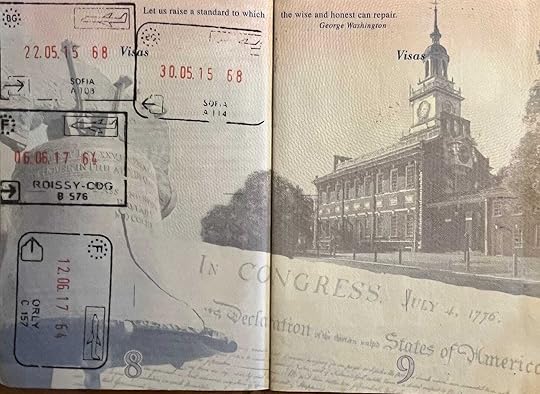 No colorful stamps on this one. Just stamped. Some nightclub stamps on your hand are more vivid.
No colorful stamps on this one. Just stamped. Some nightclub stamps on your hand are more vivid.Well, the good news is that I am getting a new passport. I’m still here. I’m still traveling. I’m still going to get up and go. In April, as a matter of fact. Paris. Can’t wait.
As for the drab passport rubber stamps, I’ll buy postcards. They’re still in color. They’ll do.
January 17, 2024
Anger
After a scene where I unleashed my anger, unjustified, I am small. I can actually sense my loss of stature. My clothes metaphorically swim on me. I have hurt her. Not physically, but in her heart. Tears. Some days, I am not the man I want to be. Shame was my sleep companion last night.
Love makes us more vulnerable. Open. It’s easier to find weak spots when someone shows them willingly to you. They want you to see them. They entrust them to you.
I’ve earned my guilt. It’s legitimate, not some short-lived imposter. It’s going to stay around for a while.
Nothing sears into you like a face that transforms from a beautiful smile, meant solely for you, into pain and sadness. I’ve inflicted that.
“You didn’t sleep well,” she says in response to my apologies.
All the more reason not to have gone after her. Anyone can be civil when things are running smoothly. The real you emerges when they aren’t.
The damage is done. How much? I don’t know. It was a surprise attack. She has to take stock.
The bitterness between couples I see in literature is often more entertainment than a teaching mirror. When it’s real, there is nothing entertaining about it. Too much is at risk. I tremble a bit this morning, looking over the edge of the cliff. Love can be killed. If there’s any lesson or reminder to this, it’s that.
January 11, 2024
My stumbling first steps on TikTok
TikTok, for money-starved people like me, is like the lottery. Everyone who thinks about taking part, thinks they’ll become famous and rich—preferably the latter. There are so many stories of people who have earned, and are earning, substantial amounts of dough on TikTok.
A granny in Dubuque does a series of roller skating videos and has just been booked on Jimmy Kimmel. Some 11-year-old kid constructs elaborate forts out of the Wall Street Journal and now has his own line of clothing. A Fed-Ex driver from Maine taught his cat to sing opera and will soon appear in the Hollywood Bowl. (I made those up, but I’m not far off.)
A friend, listening to my money woes, suggested I consider TikTok.
“You’d be great. The Art Herman videos you did for Instagram were ahead of their time. You should do them for TikTok.”
He was referring to a series of one-minute +/- videos I did as a crotchety, unshaven older guy with liver spots and odd opinions that I posted on Instagram a while back. I named the character Art Herman. Art is—what?—I guess a combination between Buster Keaton and an unhappy Bernie Sanders, minus the energy. Here’s a sample:
It was fun inhabiting a character I created and seeing what he would say. Often, I didn’t know until I started recording. Some videos were better than others, to be sure. A few people seemed to like them. Some people, like my younger sister, did not. (“Stop,” she said.) After about six months and a fan base hovering on modest, I did, in fact, stop.
But my friend remembered them. And as I say, he encouraged me. So, what the hell. I recorded a new Art Herman, and posted it on TikTok. And waited for the sponsors to call, offering me uncountable sums of money.
Instead, I got a series of people “liking” my video. These people were all very similar.
They were, almost to a person, female, scantily clothed, under 25—more probably under 20—with come-hither looks and lots of revealing photographs that Hugh Hefner would be happy to sort through. I am too straight-laced to post some of those photos here, but you can probably visualize them if you try or care.
I wondered why? Art Herman is nowhere near their age. Art could be 80+, has little hair, a grizzled look, no charisma and probably zero libido. Why are these “SexyLady 875632’s” responding to Art?
Being whip smart as I am, it didn’t take me too long to figure out that it was because of all these characteristics that they like Art. They must assume Art has some money, and that he is not too far from dying. The combination must seem irresistible. But how did they find Art? Do they have some kind of search engine whose setting is “old guy who may have very disposable income and looks on last legs”?
If they only knew about the money!
My ego was slightly bruised by their response being solely monetary instead of a reaction to Art’s wit and wisdom. To the outright cleverness of it all!
The road to riches is a longer one than I thought.
January 4, 2024
That wacky French language
I spent Christmas with my sister and her family in Denver. We had a great holiday. Her grandson, Charlie, aged 9, wants to learn French. He’s going to France in June. I volunteered to get him started.
We breezed through “How are you?”; “Goodbye”; “My name is Charlie”; and the numbers 1-10.
Then I said, “There are some French words that are very funny, Charlie.”
“Like what?” Charlie said.
“Like pamplemousse,” I said.
“What does that mean?”
“It means “grapefruit’,” I said.
“That is funny,” Charlie said.
“Want to hear another?”
“Yes.”
“Cacahuète,” I said. “That means “peanut.”
“That’s not funny.”
Ignoring the response, I said, “If you want a grapefruit, you say that you want un pamplemousse.” It’s masculine. If you want a peanut, you say, une cacahuète. It’s feminine.”
My sister’s ears picked up.
“What do you mean feminine or masculine?” she said.
“French nouns are either masculine or feminine,” I said.
“What? How can a thing be masculine or feminine? A fruit is a fruit. A vegetable is a vegetable.”
“Not in French.”
“Why? That’s the craziest thing I ever heard. Are you telling me a head of cabbage is female? And..”
“Let’s see,” I said, racking my brain, “what is the word for cabb…”
“And a potato is a female?” That’s ridiculous. A vegetable is a vegetable.”
“Yes, that’s true, but….”
“Who says whether a vegetable is a female or male? Who makes that decision?”
“That’s a good ques…”
“What if I disagree? What if I think a grapefruit is female? It sounds and looks more female to me than a peanut!”
“You have a point. In some cases, it doesn’t make sense.”
“In all cases! When I look at a potato, I don’t think what sex it is. I think. ‘There’s a potato.’ Why do they have to complicate things?”
“Well, it’s just the way it is. Italian and Spanish are the same. All romance languages are.”
“What’s the matter with those people?”
Actually, as she went on, I realized she had a point. But long, long ago, I’d stopped trying to figure out why foreign languages have certain rules and regulations. What’s the point? I can’t change them, and so it’s a waste of time. Just accept, and learn.
This was not going to be the case with my sister. I wonder what it would be like if I unleashed her at an annual get-together of the Académie française with her objections? These people are in charge of all things pertaining to the French language, and can add, subtract and change words. I think they’d be impressed. They might take action. My sister is convincing.
Until then, with the cultural atmosphere the way it is, I can see it now. At those wonderful open-air markets France is celebrated for, there will be a new kind of listing:
PAMPLEMOUSSE
Pronouns: he/him
December 28, 2023
Florent's loft
When we left off, Florent Morellet had invited me to use his loft in New York’s Soho for a classroom of writers who had originally met at Gotham Writers Workshop and wanted to continue the party. The year was 2008.
Florent, he of the self-named, celebrated New York restaurant, had his loft on the 11th floor of a building on Lafayette Street just north of Spring Street. It was deep in New York City’s Soho.
Soho, a part of lower Manhattan, like the Meatpacking District where Restaurant Florent thrived for 23 years, became a place transformed. It went from a sparsely-inhabited, semi-industrial, somewhat gloomy area of the city to a glamorous, expensive, highly-trafficked showplace. I was lucky enough to live in Soho in 1980 before all the metaphorical Botox had been injected into its visage.
Still, with its imposing cast-iron columned buildings, Soho has a dignity and elegance that can’t be disfigured by money or fame. I loved going there even as I found it harder to recognize. I still do.
Florent had a spacious room in his loft, overflowing with natural light from large windows everywhere, with a Downton Abbey-sized table where we would meet once a week from 11 to 1. The class took place in the fall and spring. It continued for three years. I never had a better teaching experience. I miss it dearly.
 237 Lafayette in Soho, home of Florent’s loft on the 11th floor
237 Lafayette in Soho, home of Florent’s loft on the 11th floorI can see Florent now, in shorts and T-shirt, sandals, wandering in from the other side of his loft with a cup of coffee, sleep still hovering about him. He had a husky voice, big smile. He had strong opinions, and he wasn’t reluctant to express them.
He didn’t like France, for example, the country of his birth. He felt America, and New York in particular, was his true country of origin. He was unabashedly gay. Not only was he out of the closet, I don’t think he’d ever walked into it. He knew everyone, but never acted as if he did. He believed in justice, social and personal, and put his money where his mouth was.
1985, when he opened Restaurant Florent, the AIDS epidemic was raging. There was a lot of fear in the air. He himself was HIV positive. This was no secret. In fact, the opposite. He used to put his T-cell count, an indication of how his immune system was dealing with HIV, on the blackboard in his restaurant next to the day’s specials. Where else have you heard of something like that?
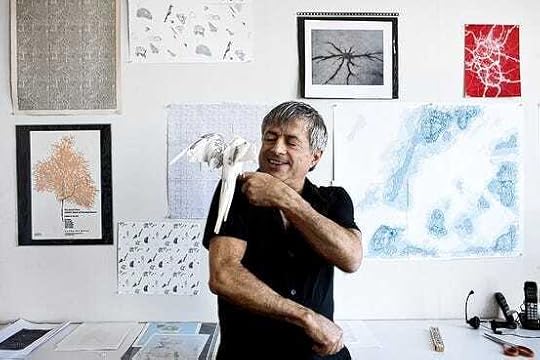 Florent in his loft
Florent in his loft One of the reasons he let us meet in his loft was because he was interested in writing his memoir—or at least people told him he should. To wit: the story of how this unknown man from France could, with little more than gumption, guts and iconic determination, open a restaurant in one of New York’s seediest neighborhoods only to have it become the place to go for the next twenty years or so.
He wasn’t fazed by his fame or by his legacy. “I hate nostalgia,” he would say again and again. He meant it. He never looked back.
That’s why his memoir was doomed. Ultimately he just wasn’t interested enough in writing that book. He wasn’t a bad writer at all, especially when you consider his first language wasn’t English. He wrote in his own voice, and that voice was without guile, straightforward and fearless—like the man himself.
But it became clear that he just wasn’t motivated to tell the story of his life. Besides, sometime during the three years we met at his loft, a documentary was released about this same story he was trying, so unenthusiastically, to write, “Florent: Queen of the Meat Market.” I went to its premiere. Its energy delights.
I want to tell you about the workshop itself, and the people who came and went, and the lovely time we had there. And I will. But this prologue is dedicated to Florent Morellet with great gratitude. Unlike him, I love looking back on those remarkable hours we spent in his loft trying to be better writers.
December 22, 2023
Morning!
Despite whatever mess or confusion, whatever heartache, I went to bed with, morning gives me a clean slate. When I get up, around 5 or 5:30, morning comes to me with optimism in hand, with promise, with a sense of rebirth. Sins are forgiven—at least temporarily.
Morning gives me clarity—especially since I quit drinking five years ago. I can see for miles.
I feel years—decades—younger. Morning is my fountain of youth. Don’t ask me to lift anything heavy, though.
I do need a cup of bitter-strong, iron-melting coffee. I’m not Thoreau who said the only stimulant he took was morning air. No, no, I need high-octane java, black as tar, intense and, to many others who have tried it, vile. I need that in my veins.
 I need you.
I need you.Then birds start singing. The sun rises. What more do you want?
I know some people hate mornings. Stay away from me, they say, or imply, with their baleful look and body language. They do everything but snarl. Some do.
Not me. I’ve got a smile on my face for the whole human race.
It doesn’t matter if it’s winter and it’s dark as night outside when I get up and go to my desk. It’s still morning. Everything is being born, darkness or not. Nothing that happens has ever happened before.
Morning is trustworthy. It brings a clarity that makes it all but impossible to sneak some writing by myself that is lazy or dishonest. And, believe me, I try. Morning shines a you-can’t-fool-me light on that effort.
At a certain point, I sense morning losing its vitality. As Brendan Behan said, “The morning is always a good time. Till about eleven o’clock when it begins to feel its age.”
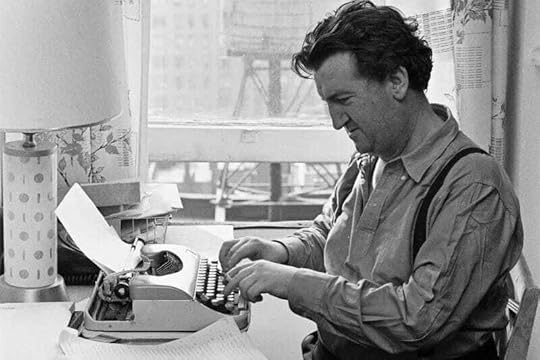 Brendan Behan working—in the morning?
Brendan Behan working—in the morning?Then, suddenly, like some specter, it’s gone. I’ll resist the urge to write metaphorically about the similarity to life itself, but I suppose I’ve just done that.
Morning gone, I have to make my way through the day, take whatever there is, just live. As with all of us, it’s not always easy. The day gets older, weakens. I feel that way, too.
Until, hours later, having stumbled along the day’s path, piled up mistakes and misses, chalked up fresh regrets and roads not taken, and hopefully moments to be proud of, made a few people laugh, the time arrives when, at last, I can crawl under the sheets and begin, once again, my sleepy journey toward dawn.
December 20, 2023
More "Poetry? What? Are you kidding?"
Recently, I wrote a piece about how people can be hoodwinked into believing bad, even incomprehensible poetry is good. And that they can be made to feel less than smart for not recognizing this so-called quality, much less comprehending said poetry.
Thank God for someone like the writer Mary Karr who has the guts to say, simply, that some poetry is, indeed, incomprehensible. Just as you thought it was. It’s critics who make you feel dumb. Which you are most certainly not.
Finding your own way in literature and art in general can be difficult. But it can be hindered by critics who are always ready to tell you what you don’t know or understand.
Take the case of Robert Frost’s celebrated poem, “The Road Not Taken.” Most likely you know it, or have heard of it. It has those famous last lines, “I took the one less traveled by, / And that has made all the difference.”
Well, leave it to a critic to tell you that you don’t know what this poem means. Maybe you thought you did. But…no!
David Orr, a poetry columnist for the New York Times Book Review, tells us that, look, “the poem isn’t a salute to can-do individualism; it’s a commentary on the self-deception we practice when constructing the story of our own lives.”
You didn’t know that? What’s the matter with you?
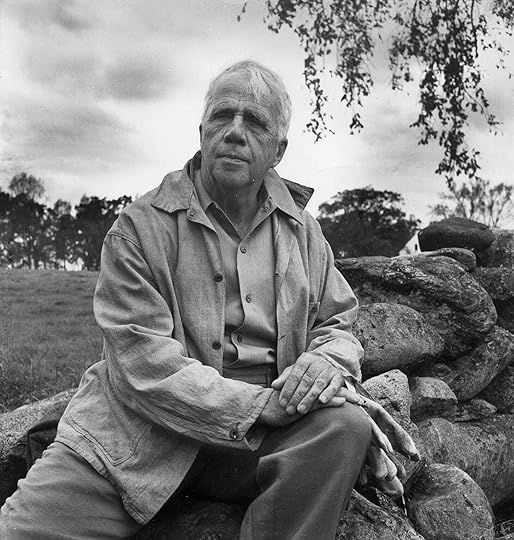 Robert Frost—who you thought you knew.
Robert Frost—who you thought you knew.And, by the way, the fact that Robert Frost is immensely popular? Loved by so many? Orr tells us, “This level of recognition makes poetry readers uncomfortable.”
Does it make you uncomfortable that Frost is known and read by so many people? It doesn’t? Well, maybe you’re not up to Orr’s standards, dear reader. Hang your head.
To blazes with critics. Yes, you can learn from them, but, as Chico Marx said about Harpo once, “He’s honest. But you have to watch him.”
The writers I trust who write about literature are other writers. In terms of Robert Frost, I’d suggest, Homage to Robert Frost by Nobel Prize-winning fellow poets, Joseph Brodsky, Seamus Heaney and Derek Walcott. Or the poet Randall Jarrell’s appreciations of Frost in his book, Poetry and the Age.
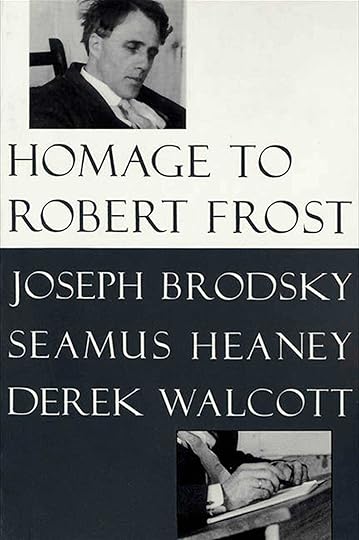
Those blokes will steer you right. If, in fact, you need steering, which you may not. Don’t let the Orr’s of the world get into your head. So many critics write from their brain and not from their heart. They make arguments, not celebrations. They have a motive in their writing, and that motive is not always to help you grasp the poem.
Career, maybe?
Is some good poetry difficult? Yes, it is. Because it’s trying to express the inexpressible.
But you don’t need me to tell you that.
Happy holidays!
December 14, 2023
Florent
In the fall of 2008, I taught a writing class at Gotham Writers Workshop in New York. Notoriously low-paying, Gotham still offered what a freelance writer was always grateful for: a gig. This particular course had about fifteen students, as I recall. There was a large oval conference table around which these aspiring writers sat. One of the few advantages of teaching in such a basement-priced program is that it draws all sorts of people who are looking for a quick and easy method to write. Gotham distributes its course offerings in little kiosks on what seems like every street corner in New York. Everybody knows about Gotham.
Among the students that fall was a merry, husky-voiced man with a singy French accent named Florent Morellet. I did not recognize the name. Some New Yorkers would have. Because Florent had been the owner of a celebrated restaurant named after himself, located in the meatpacking district of New York. I checked, and Restaurant Florent closed in June 2008, so he was coming to this class just a few months after a 23-year run of owning and running one of New York’s most legendary night spots. I did not put two and two together when Florent introduced himself, though. I’ve never been a nocturnal animal, and the night was Florent’s domain. I had, in fact, been to Restaurant Florent just once, I think, but that didn’t come to mind when he told the room his name.
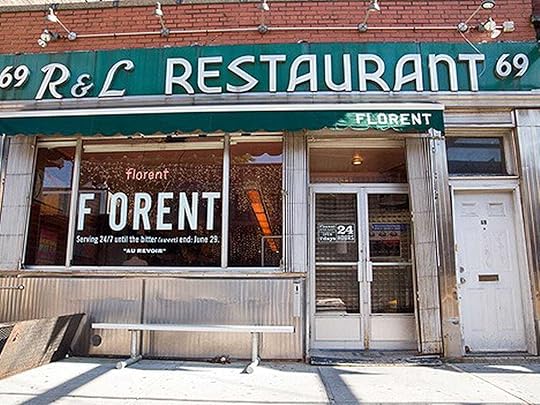
I knew the neighborhood, though. The meatpacking district. In 1985, when Florent opened his restaurant, it was a deserted, dangerous corner of the city that was home to dead-end transvestite prostitutes and desperate addicts, not to mention muggers, especially on late weekend nights. I lived nearby and used to ride my bike there early Sunday morning. A few artists had their studios there and there was a Portuguese restaurant somewhere and, of course, the meatpacking warehouses by the river. It was a chancy area, dirty and unkempt, but wonderful in its way, because it was cobblestoned and old New York, caught in amber as it were, untouched by developers.
That’s all changed now. The Whitney Museum is there. The High Line starts there. A slew of fancy stores line its streets. Restaurants, too. Tourists throng the area. It’s hard to imagine how daring it was for Florent to start a restaurant there in 1985. I assure you, it was. Despite the menacing area, Restaurant Florent quickly became the place to go. Name a name from that era, and you’d eventually see them there.
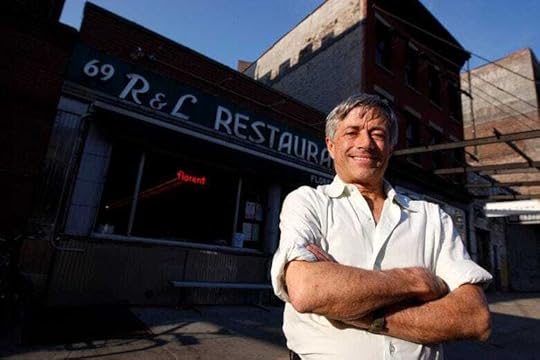 Florent Morellet
Florent MorelletThat day at Gotham’s classroom, everyone introduced themselves, Florent included. We had an array of professions and personalities, including a retired police captain from Rockaway Beach, a distant part of Queens. When he told the class who he was, and where he was from, Florent exclaimed,
“I know that place! I used to go cruising nearby.”
“Oh, really?” replied the retired police captain, slightly confused.
Florent smiled what I came to know as his wide-open, solar smile.
The class went well enough, I guess. Florent was there because someone told him he should write a memoir about his restaurant. Several students seemed to have an interest in continuing to study with me, including Florent. I told them I would be happy to do that but not at Gotham, because I had rent to pay. Without hesitation, Florent said,
“You can do it at my place.”
I looked at him. “Really?”
“Sure,” he said. “I have a loft in Soho. We can meet there.”
And that’s how the adventure began.
December 7, 2023
Waiting for your father
I don’t know how many of you have watched Reservation Dogs. It’s a series on Hulu. IMDb describes it as a “comedy series about four Native American teenagers growing up on a reservation in eastern Oklahoma.” It’s very good. Original. Poignant. And funny.
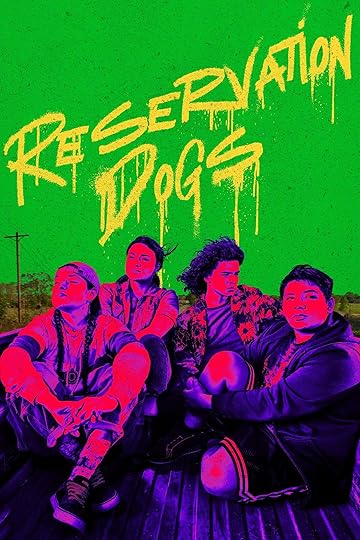
There’s one relationship in particular that got to me. One of the characters, a young guy named Bear, lives with his mother. His father, a would-be rapper, is, what’s the word? Absent. Bear longs to have him in his life. At one point, his father promises to visit. Bear goes to all extremes to prepare for the visit, borrowing money to buy his father a costly present. His anticipation builds. And builds. We go with him, knowing, somewhere in the back of our minds, the dad won’t show. He doesn’t. He calls and makes some transparently flimsy excuse. Hopes dashed. Watching Bear take in that disappointment is hard. You feel it through the screen. The vulnerability. The want, the need.
This is the same thing that happens at the beginning of J.R. Moehringer’s memoir, The Tender Bar. The young boy, our hero, who lives with his mother, yearns to see his dad, who is a well-known radio personality. Absent. His dad calls him one day and says he’ll take the boy to a baseball game. The son, overjoyed, sits on the front steps of his house, hours early, waiting for his dad. Waiting. And waiting. It’s painful to watch him there, Mets baseball cap on, glove in hand, watching the road, for hours. His father never comes.

The great deep disappointment of waiting for a father who doesn’t show up. Literally or figuratively. Who promised he would. The disappointment runs as deep as disappointment can. This relationship is lifelong, no matter what state it’s in, requited or unrequited. There is a reason you find this son-father yearning dramatized again and again in books, plays and films. It always will be.
When I was a kid, we had something called Field Day at my school. It was on a Saturday, in the spring, and it was a day where there were games, contests and races. Parents came and watched their kids run, jump and throw. The races and contests were divided into two categories, Upper School and Lower School. Lower School meant 4th, 5th and 6th grades. Generally, the 6th graders won most of the contests because they were bigger and stronger.
This year I was a 6th grader. I was excited, for months, with anticipation. I was a good athlete, fast, and there was a strong chance I would win a few races. I burned with a desire to have my dad come and watch me. It meant the world to me. It’s so different having your dad watch you at athletics than your mom, especially if you’re a boy.
The day finally arrived. Saturday morning. My father was in the living room, sitting on the couch, reading the newspaper. I came up to him cautiously, hopefully, and said,
“Dad, today’s Field Day. Are you coming?”
Without looking up from his newspaper, without acknowledging me, still reading, he said,
“No.”
November 30, 2023
The green beans aren't salted
Last Saturday, we went to an all-day, post-Thanksgiving celebration in Jefferson Parish in southwestern Louisiana. (Counties are called parishes in Louisiana.) This part of Louisiana is rice country. The land is flat and, for the most part, there are no trees. It’s called the Cajun Prairie, and when you drive through it, mile after mile after mile, you might well think you are in Kansas or in one of the Dakotas. That kind of landscape, flat and forever, made me feel a bit lonely in an exquisite way.
My wife and I were invited as guests by the family she had nannied for in the past and who had since moved away. They are a sweet couple, with two little girls. They’d come home for Thanksgiving, and invited us to this grand fete.
It was a gorgeous day, in the mid-sixties; the sun was strong, and there was little wind. We drove through the voice-quieting level land until we turned down a quiet country road and reached our destination.
It was a compound of small houses leading to a large, open-ended barn. Over 100 people were gathered there, drinking and eating and enjoying the day. There was a long table overwhelmed with food: gumbos, stews, pulled pork, various slaws, sweet potatoes, dishes I didn’t recognize, more than I or anyone could eat. The sun spilled into the barn, and its warmth and brightness was mirrored by the mood of the people. We found my wife’s former employers and stayed and talked with them a while and then sat with plates and ate and met some new people.
Then came the music. There was a bandstand, and about 2pm, musicians made their way there. They were, except for one man, African American, and the music they were going to play was Zydeco. The band was Joe Hall & The Louisiana Cane Cutters.
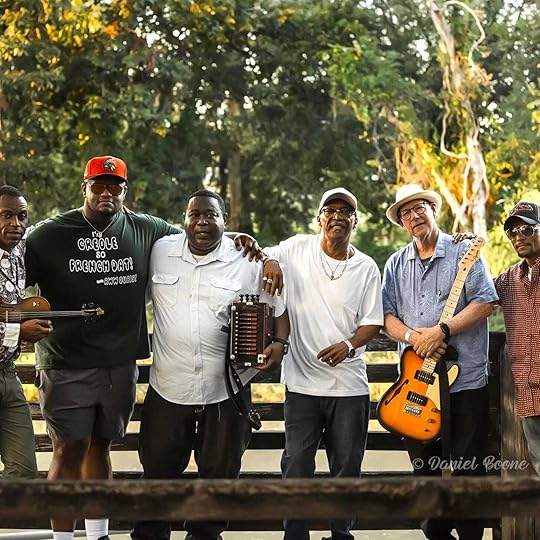 Joe Hall , with accordion, and his Cane Cutters
Joe Hall , with accordion, and his Cane CuttersZydeco is “a music genre that blends blues, rhythm and blues and music indigenous to the Louisiana Creoles.” The origin of the word is uncertain. One theory is that it’s derived from the French phrase, les haricots ne sont pas salés, which means, “the green beans aren’t salted.” When pronounced, it sounds something like the word “Zydeco.” Maybe. This phrase was used to express hardship: when you don’t have enough money for salt, things are tough.
Zydeco is mainly, but not solely, played by African American musicians. The most famous of these was probably the late Clifton Chenier. Its main instrument, the centerpiece, is the accordion.
The band began to play. Immediately, the man who owned the barn and all the outlying buildings and who was at least in his sixties, got up with his wife and began to dance. He was soon followed by other couples. Most of them were in their fifties or sixties, seventies and older.
Zydeco is one of the most danceable forms of music you’ll ever encounter. The couples knew how to dance and had probably done it all their lives. They grew up with it. They spun around the floor smoothly.
I had been feeling a bit blue about this whole aging thing lately. And the slow segregation you begin to experience as an older person. Your world gets smaller and smaller. Once, for example, you felt comfortable in bars. Then, one day, you walk into a bar and find no one remotely your age. So, you leave. This is the same for many places, events. We’ve all felt excluded by looks and body language.
This is accompanied by a general feeling that you are no longer competent as a person. This is called agism. It’s also called getting old. Eventually, you may find yourself conversing, mingling, socializing uniquely with people your own age, like some kind of restricted country club from the 1950s, except instead of rejecting black, Jews, Catholics, Italians or whomever, they world in general doesn’t want the pleasure of your old, white-haired, mottled-skin self.
I’m not telling you anything new, or that you haven’t heard before.
Hearing about it, though, and experiencing it are two different things. My reaction to all that is one of sadness and of anger. Sad, because I don’t want to be excluded from anything joyful. Anger, because how dare you 20s, 30, 40s-somethings tell me I’m not wanted. I’m powerless, though, to change that.
My wife read these words and got teary. “I don’t want you to buy into this,” she said. I don’t. I feel young inside. I have energy to spare. But I can’t control the outside world.
I was talking to a friend the other day, a woman about ten years younger than I am, but still in the “older” category, about all this. She said that agism is the only “ism” that is still acceptable to practice. She said that people are still able to make fun of old people. Agism isn’t woke. It’s still sleeping, or nodding off, or napping.
Which leads me back to the barn where my wife and I were watching the people dance to Joe Hall & The Louisiana Cane Cutters. When was the last time I saw older people dancing like this? With panache, pleasure, skill? Not shuffling around listlessly but with brio. At a wedding, perhaps. Other than that, nowhere.
It struck me how beautiful it was. Here they were, older couples dancing at a party, and it all seemed right. What made it all the more lovely was that the older couples were dancing amongst a crowd of younger people. This was everybody dancing. There was no agism at this party. My wife and I danced with the others. I thanked Zydeco and this part of Louisiana gratefully and sincerely.
When you don’t see something for a long time and then you do, and it’s something that makes you feel alive, the world becomes full of possibility.
Here, it was as it should be. People, all of us, living life, living life, living life.



